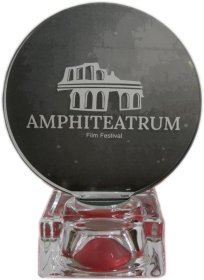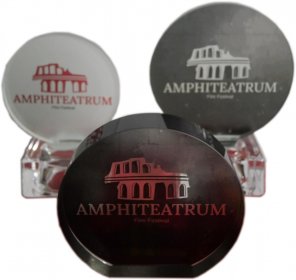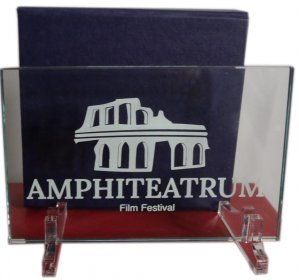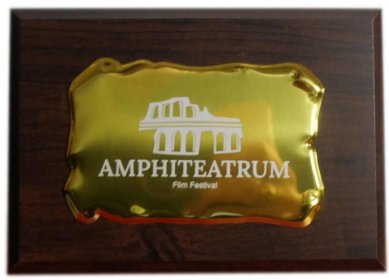Standard Fee
15€

Submissions deadline
15 Nov 22
1.2€
18 May 2022
Call for entries
15 Nov 2022
Festival closed
17 Dec 2022
Notification date
15 Jan 2023
15 Jan 2023
Festival start: 15 January 2023 Festival end: 15 January 2023
The Amphiteatrum Festival was born in the city of Santa Maria Capua Vetere (Santa Maria 'e Capua in dialect, also abbreviated as Santa Maria C. V. or S. Maria C.V.) is an Italian town of 31 868 inhabitants [1] in the province of Caserta in Campania.
It stands exactly on the ruins of ancient Capua, as attested by the numerous monuments of the Roman era - above all, the Campanian Amphitheater, second in size only to the Colosseum - as well as by the etymology of today's toponym. After the ancient glories, the city changed into a peasant village with the name of villa Santa Maria Maggiore (villa Sanctae Mariae Maioris) and became part of the universitas capuana.
City famous for the history of the great Spartacus, Rebel Gladiator
Precisely little is known about his youth, except that in all probability he was born in Thrace [1], at an unspecified place on the banks of the Strimone river (today's Struma river, in Bulgaria), between 111 and 109 BC about, in an aristocratic family belonging to the Maedi tribe. From an early age he served in the ranks of the Roman army, with which he fought in Macedonia, and, as reported by Plutarch, he was married to a priestess of his own tribe, dedicated to the cult of Dionysus.
Spartacus was not his real name, but a nickname, most likely given to him by Lentulo Batiatus, and possibly generated as a Latinization of Sparadakos ("famous for his spear") or Spartakos (which could perhaps indicate a particular place in Thrace or the very name of some legendary ruler of the region [2]) or, again, as a possible reference to the Greek city-state of Sparta, the warrior city par excellence in the ancient imagination. [3]
The iron Roman discipline that he had to endure within the militia convinced him, in the end, to desert and try to escape. As reported by Appiano of Alexandria [4], he was soon captured, judged a deserter and sentenced, according to Roman military law, to enslavement, probably together with his wife (which is not unusual). Appian also reports the theory according to which Spartacus was not enslaved for desertion, but because he was a prisoner of war as an ally, with his tribe, of Mithridates VI of Pontus during the war of the latter against the Roman Republic. [3] The strong knowledge of Roman legionary tactics demonstrated by Thrace during his revolt, however, has led modern and contemporary historians to favor his past as an auxiliary ex-legionary. [3]
Later, around 75 BC, he was destined to be a gladiator; Spartacus, in fact, was sold to Lentulo Batiato, a lanista who owned a school of gladiators in Capua. According to Plutarch, while he was in Rome waiting to be sold, one night a snake coiled around his face as he slept, which his companion prophetess would have interpreted as the omen of "a great fortune" or, according to another interpretation of the text of the Greek historian, of "a great misfortune".
In Capua, Spartacus was forced to fight inside the famous Campania amphitheater against wild beasts and other gladiators, as was the custom at that time, to amuse the people and the aristocracy.
The festival was born to reward Directors, Actors, Composers, screenwriters through their works
Premio in cristallo e diploma di partecipazione
sezione lungometraggi
sezione documentari
sezione cortometraggi
sezione serie
Miglior Corto
Miglior Attore/e
Miglior Brano
Miglior Storia
Migliore Regia
Per Tutti i premiati Pergamena e Premio in Cristallo con il logo del festival
AMPHITEATRUM FILM FESTIVAL 2022
REGULATIONS
Art. 1 – Organization
The Amphiteatrum Film Festival is organized by Max Oliva and Joe Nicodemo with the support of Centro Studi Help!, Progetto Carovana06, Boz Produzioni.
Art. 2 – Objectives
The Amphiteatrum Film Festival's purpose is to constitute a meeting point for contemporary international and national cinema and to provide the opportunity for a discussion on all its perspectives and artistric trends. The Festival pays particular attention to emerging cinemas and young film-makers. In its competitive sections, it promotes films by new directors whose works are characterized by strong formal and stylistic innovation.
Art. 3 – Competitive sections
The Festival is divided into four competitive sections:
feature films
documentaries
short films
series
Art. 4 – Feature Films Section
a) The selection of the films, which is final and binding, is conducted by the Festival Organizers.
b) Entry to this section is open to unscreened feature-lenght films that last at least 30 minutes. The Festival excludes from participation works that have already been screened in any way in Italy.
Art. 5 – Documentaries Section
a) The selection of the films, which is final and binding, is conducted by the Festival Organizers.
b) Entry to this section is open to unscreened documentaries that last at least 30 minutes. The Festival excludes from participation works that have already been screened in any way in Italy.
Art. 6 – Short Films Section
a) The selection of the films, which is final and binding, is conducted by the Festival Organizers.
b)Entry to this section is open to unscreened short films that last no more than 30 minutes. The Festival excludes from participation works that have already been screened in any way in Italy.
Art. 7 – Series Section
a) The selection of the films, which is final and binding, is conducted by the Festival Organizers.
b) Entry to this section is open to unscreened series consisting of at least 3 episodes. The Festival excludes from participation worksthat have already been screened in any way in Italy.
Art. 8 – Jury and Awards
The Festival will nominate a Jury of experts composed of at least five people. For every section, the Jury will award the following prizes:
best film award
best director award
best script award
best actress award
best actor award
best soundtrack
Art. 9 – Film registration and Deadline
a) There is a film registration fee for administrative expenses:
15 euros for short films
20 euros for documentaries
25 euros for series
30 euros for feature-lenght films
Films will be considered only if the fee is paid.
b) The official Festival registration form must be filled out online via Festhome . Submission fee is requested during the registration process. If a film is not selected, the submission fee cannot be refunded.
c) Copyright holders of the films who intend to participate in the Festival (in any section) must send a streaming link following the procedures indicated on the entry form, by and no later than November 15th, 2022.
d) For info about the Festival: +39 08231878425 – amphiteatrumfilmfestival@gmail.com
Art. 10 – General Rules
a) The present rules and regulations have been drawn up in Italian and English. In case of dispute, the Italian version will be final.
b) Application for entry to the Festival constitutes unconditional agreement to all the rules and regulations herein.
Standard Fee
15€

Submissions deadline
15 Nov 22
Standard Fee
20€

Submissions deadline
15 Nov 22
Standard Fee
30€

Submissions deadline
15 Nov 22
Standard Fee
25€

Submissions deadline
15 Nov 22
![]() Festhome holds accountable fees festivals by holding the payment of the fees of most newer festivals until they have viewed the submissions, held their festivals and other methods.
Festhome holds accountable fees festivals by holding the payment of the fees of most newer festivals until they have viewed the submissions, held their festivals and other methods.



